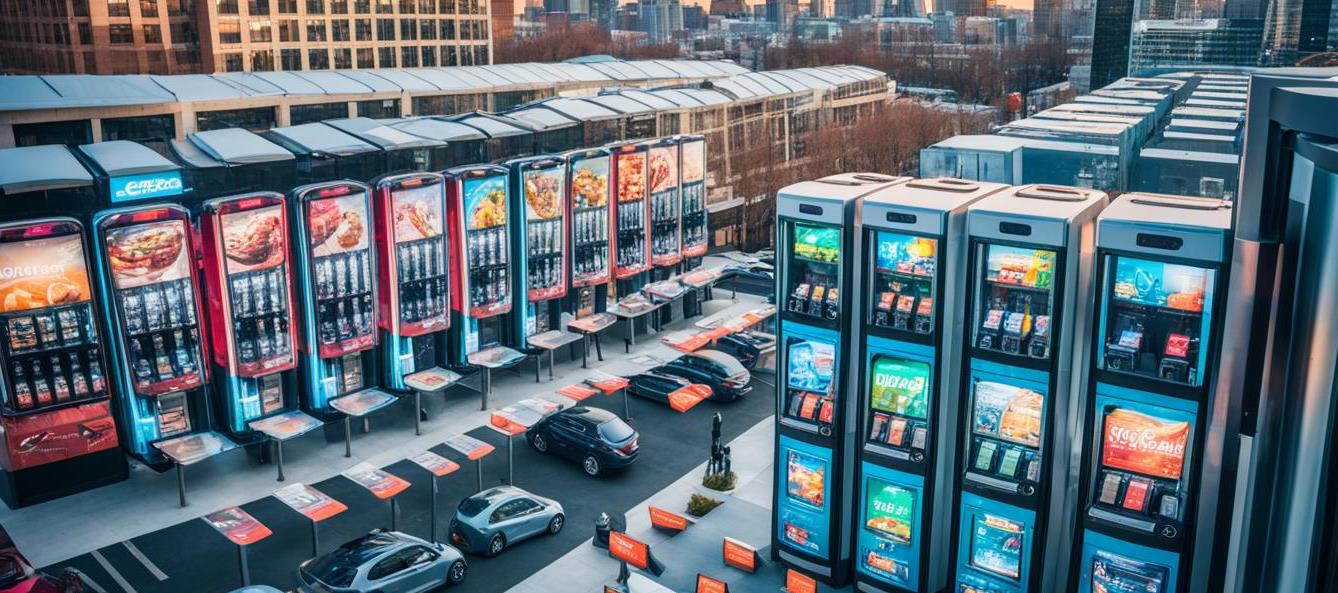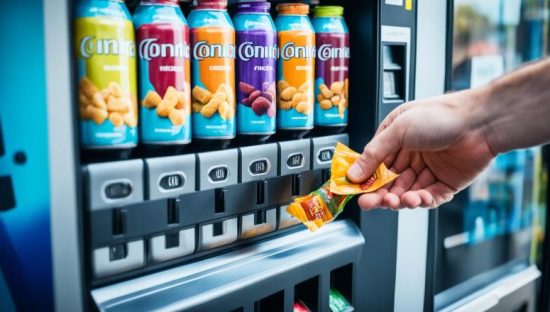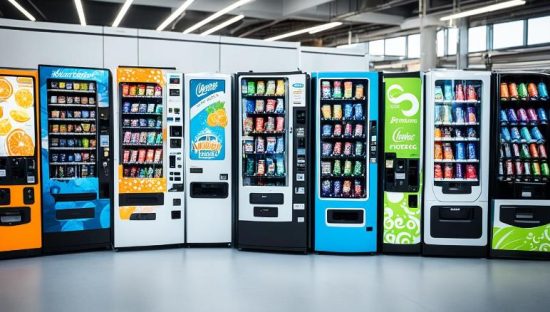
Have you ever wondered how a simple idea like a vending machine can turn into a thriving business venture? With the global vending machine market projected to hit $31 billion by 2027, now is the perfect time to jump in. This scalable and low-entry barrier opportunity, estimated at $5.8 billion in the U.S. alone, offers significant profit potential. With initial investments as low as $2,000 and the flexibility to generate impressive weekly revenues, vending machines are an enticing option for budding entrepreneurs in 2024. Dive into this startup guide to explore how to start a vending machine business as your next big move.
Why You Should Choose Vending Machine Business?
Opting for a vending machine business offers numerous advantages, including generating passive income and being a low maintenance business. With startup costs ranging from $50 to $200 for bulk machines and $2,000 to $3,000 for more advanced machines, the entry barrier is relatively low. This makes it an accessible opportunity for aspiring entrepreneurs.
Is a vending machine business profitable? Absolutely. Mechanical vending machines, being less costly, often yield higher profits, while electronic ones with touchscreens and credit card options attract more customers. Strategic placement in high-traffic areas like schools, hospitals, and airports significantly boosts revenue. With the industry expected to surpass $25 billion by 2027, niche markets such as food or electronics vending add to its financial potential. Proper management through regular maintenance and strategic acquisitions can turn vending machines into a lucrative source of passive income.
Steps to Start Vending Machine Business

Starting a vending machine business can be highly promising with a well-structured plan. Begin with thorough market research to identify high-traffic locations like offices, hospitals, and universities. Invest wisely in machines, considering costs from $50 for bulk machines to $3,000+ for electronic ones, and explore refurbished options to cut initial expenses. Establishing an LLC or corporation can help scale operations and claim tax deductions. Continuous management, including regular maintenance and understanding consumer needs, is crucial for long-term success. You don’t need a business degree for it, just follow the steps.
1. Preparing the Blue print
Creating a solid blueprint is essential for a successful vending machine business. To start with, let’s delve into the fundamentals of the business model, legal structure, and vending business plan that will underpin your venture. Establishing the right foundation ensures that your operations run smoothly and are compliant with all relevant regulations.
Detailed Idea About the Business Structure
Choosing the right business structure, like an LLC for liability protection and flexibility, is crucial for your vending machine business. Craft a detailed business plan outlining operational strategies, financial forecasts, and marketing tactics to guide your venture and attract financing. Initial capital investments can be optimized by considering used or refurbished machines, with costs ranging from $1,200 to $10,000, depending on features. Factor in operational expenses, including property commission fees of 5% to 25% of revenue, to ensure financial planning accuracy. Exploring franchising or niche vending opportunities in high-traffic areas can further enhance your business’s success.
2. Right Location
The success of a vending machine business relies heavily on strategic placement and high consumer traffic. Ideal locations include schools, hospitals, office buildings, and retail centers, benefiting from consistent foot traffic and captive audiences. Food and beverage vending machines, particularly beverages, are dominant in the U.S. market, with beverages alone accounting for 23% of sales.
Negotiating with property owners for prime locations, understanding local regulations, and considering low-maintenance machines are crucial steps. With the vending machine market expected to grow significantly, leveraging strategic placement can enhance business success. This market had a global size of $21.3 billion in 2020 and is expected to grow by 5.5% by 2027, with the U.S. market showing a promising growth rate of 8.9% in 2023
3. Machine Type and Quality

Choosing the right vending machine options is crucial for business success. The global vending machine market, valued at $21.3 billion in 2020 and expected to reach $31 billion by 2027, emphasizes the importance of investing in durable machines. Companies like Crane Merchandising Systems, with approximately $200 million in annual revenues, showcase the impact of quality machines on profitability.
There are several types of vending machines to consider, such as snack, drink, combination, hot and cold food, and coffee machines, each suited to different locations and consumer demands. Upgrading machines to accept cashless payments aligns with consumer trends and enhances the user experience. With the U.S. vending machine market estimated at $5.8 billion and a growth rate of 8.9%, investing in durable vending machines is a wise decision for long-term sustainability and profitability.
4. Perfect Market and Business strategy plans
When starting a vending machine business, conducting thorough market research is paramount. Understanding the demographics and preferences of your target audience can help in making informed decisions about machine placement and product selection. High-traffic locations such as offices, hospitals, universities, and transportation hubs tend to yield higher profits, making the location a critical factor in your business strategies.
Analyzing the competitive landscape and identifying gaps or niches that your business can fill, such as offering healthier food options, can set your brand apart. Establishing robust business strategies encompassing pricing tactics, promotional campaigns, and collaborating with wholesale suppliers can significantly boost your market presence and profitability. Regularly reassessing your target audience engagement strategies and adjusting to market trends will keep your business viable and profitable.
5. Creating Bank Account and Financial Transactions
Effective financial planning and banking practices are crucial for the success of your vending machine business. Maintain a dedicated business bank account for clear expense tracking and simplified tax reporting. Implement a system for managing cash flow, including monitoring sales and tracking transactions. Utilize financial management tools for real-time insights and informed decision-making. Negotiate rental fees with property owners to mitigate expenses in high-traffic areas. Establishing robust financial protocols early ensures smooth operations and facilitates long-term scalability, regardless of your vending machine type.
6. Stocking Products
Repairing and Maintaining the Business

Ensuring the long-term success and sustainability of your vending machine business hinges on regular maintenance and prompt machine servicing. The workload for maintaining your vending machines, whether you have a few or several hundred, includes key tasks such as repairing, restocking, and collecting money from transactions. Developing a robust maintenance schedule is crucial to minimize downtime and maximize profitability.
Different types of machines necessitate varying degrees of attention. For instance, bulk machines, which typically cost between $50 to $200, are less complex and thus easier to maintain. Mechanical machines, costing about $2,000, and electronic machines, starting at $3,000, often require more sophisticated servicing. Electronic machines, in particular, benefit from features like touch screens and credit card payment options but require ongoing technical support to stay fully operational and profitable.
Building strong relationships with repair service providers can be invaluable. This proactive approach helps to promptly address any issues and ensures consistent machine performance. Additionally, regular spot checks and preventative maintenance can help identify potential problems before they escalate. By keeping your machines in top condition, you not only sustain your business but also enhance customer satisfaction, facilitating long-term business sustainability.
FAQs on Starting Vending Machine Business
Is a vending machine profitable?
Yes, a vending machine can be quite profitable if placed in a strategic location with high consumer traffic. Profits vary depending on the products offered and the frequency of sales, making it essential to choose the right machine and location.
Can you own a vending machine in India?
Absolutely. The vending machine industry is growing in India, offering opportunities for entrepreneurs to set up and manage vending machines in various locations across the country.
How much does it cost to refill a vending machine?
The cost to refill a vending machine depends on the type of products it dispenses. Typically, refilling costs can range from a few 100 dollars to several 1000 dollars, based on the volume and variety of stock required.






